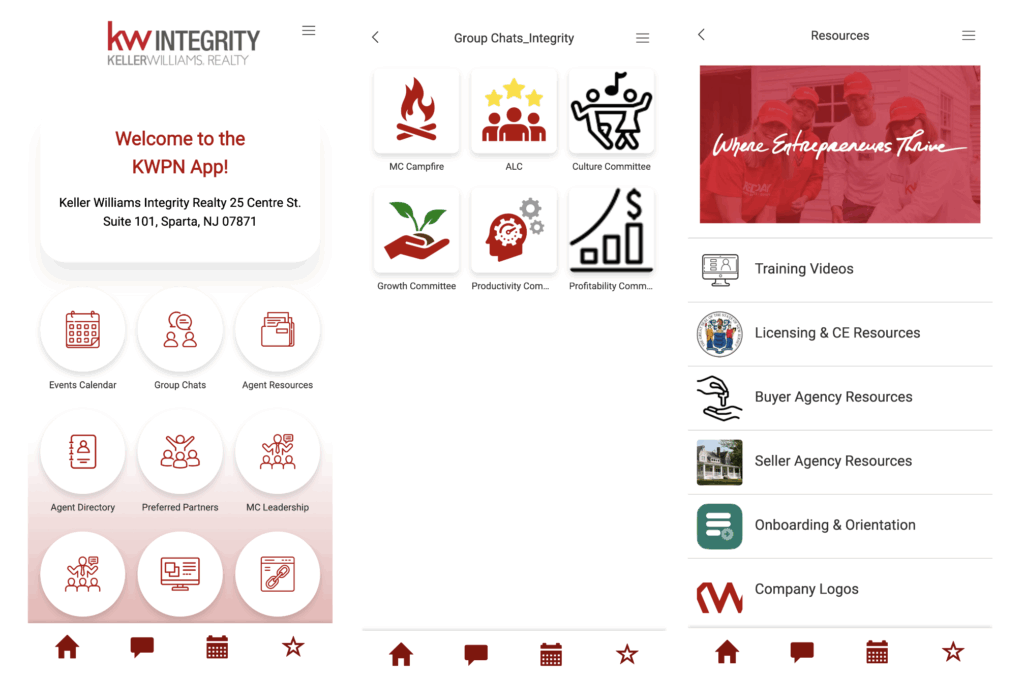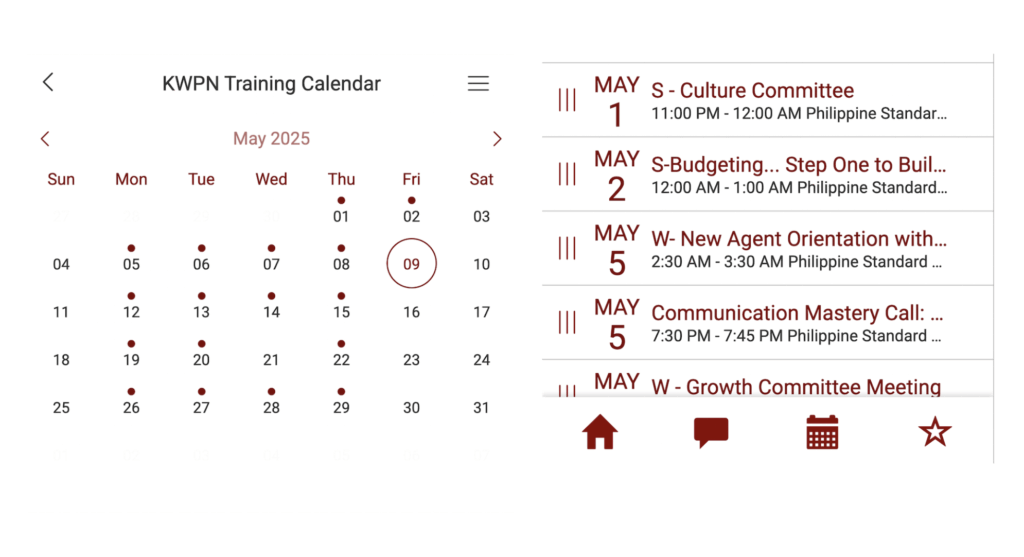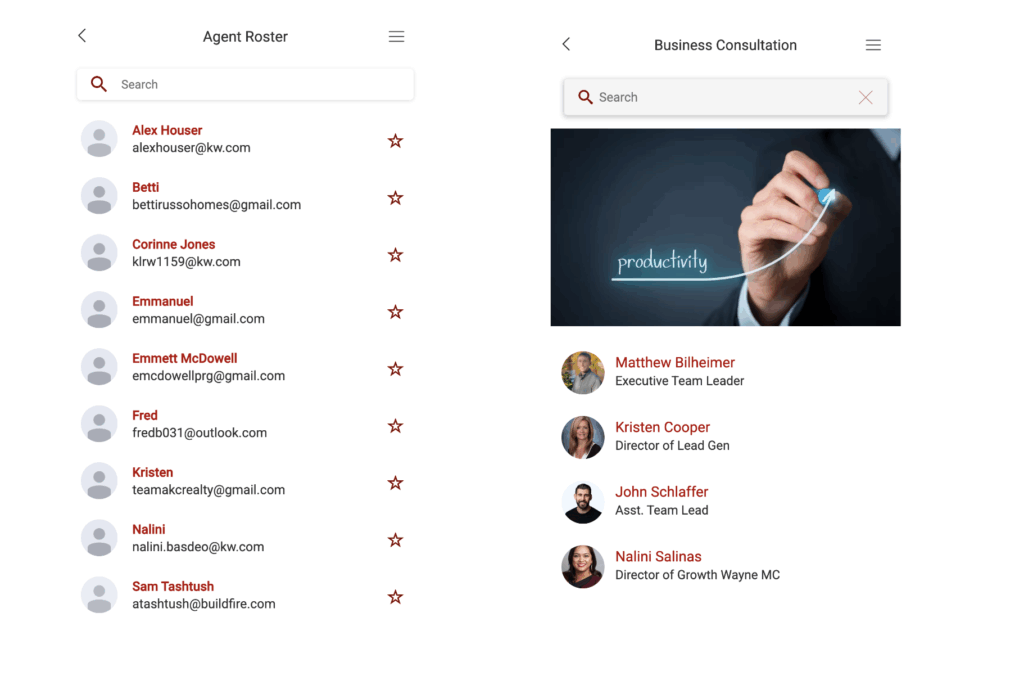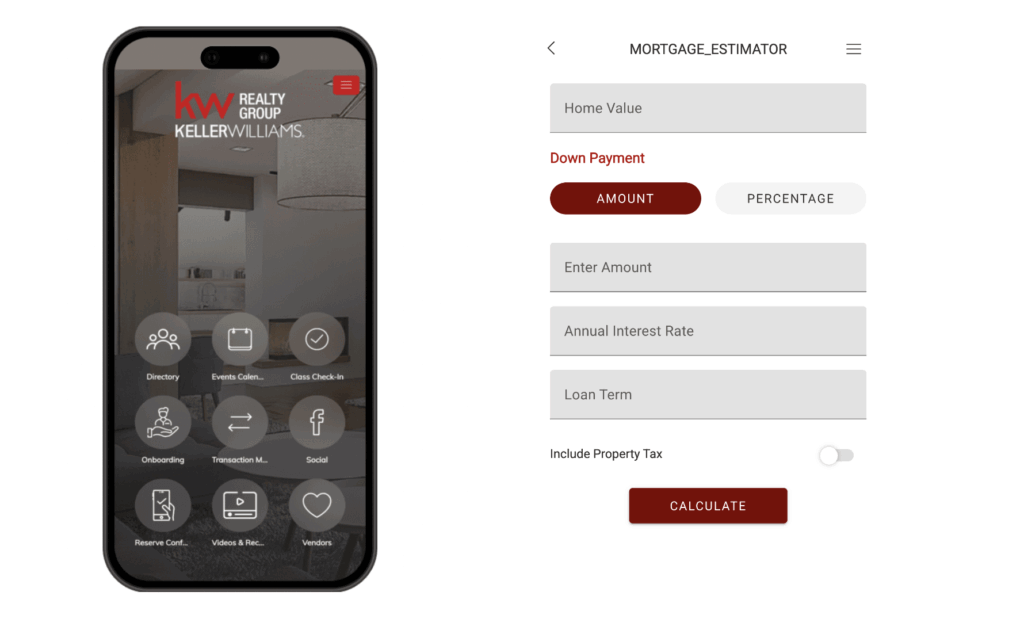The real estate industry has gone through a dramatic digital transformation in recent years.
While traditional methods of buying, selling, and managing properties still have their place, modern brokers have increasingly turned to mobile apps to streamline operations, enhance communication, and provide better service to their agents and clients alike.
Mobile apps have become essential tools to help real estate brokers stay competitive in an ever-changing market.
Today’s real estate apps go far beyond basic property listings. They serve as complete business management platforms, handling everything from agent communication to compliance training.
If you’re looking to modernize your operations and empower your agents with cutting edge tools, here are some of the most common real estate app features and use cases that we’ve seen from clients.
1. Internal Communication
Modern real estate apps provide a centralized communication hub where brokers can instantly connect with entire teams or specific groups of agents.
With features like instant messaging, group chats, and internal message boards, your team can stay connected and support each other for various use cases.
We’ve seen agents use this to collaborate on deals, share information, provide updates, and ultimately be able to make faster decisions compared to traditional communication methods (like email and text), where time-sensative requests get buried amongst non-critical messages.
This immediate access to support and information helps agents close deals faster while providing better service to their clients.
It’s a standout feature that’s been implemented for industry leaders, including the Keller Williams mobile app created by Buildfire.

2. New Hire Onboarding
Real estate apps can help streamline the onboarding process for new agents and other members of your team.
You can use it to create a structured onboarding workflow to guide new hires through everything that’s required as they join the brokerage. These onboarding systems can include welcome videos, interactive checklists, document signing, and progress tracking.
New agents can complete onboarding at their own pace while ensuring nothing important is missed or overlooked.
Brokers benefit as well from a standardized process to ensure every new hire has a consistent experience and has full access to all resources on day one.
This is more important than you might realize. In fact, a strong onboarding process can improve agent retention rates by 82% and boost their productivity by 70%.
3. Agent Resources
The life of a real estate agent involves constant movement. Being tied to a desk isn’t an option. Agents are constantly meeting with clients, showing houses, and commuting from one property to another.
Having fast access to resources 24/7 from their smartphones is essential, and it will ultimately make them better at their jobs.
You can curate all of our internal resources that can be accessed from a single screen with one tap, supporting everyone on your team. Examples include:
Seller Agent Resources
- Market analysis templates
- Pricing strategies
- Staging checklists
- Marketing campaign materials
Buyer Agent Resources
- Mortgage pre-approval guidance
- Neighborhood information
- School district data
- Buyer consultation materials
For new agents and veterans alike, being able to access this stuff quickly not only helps them close more deals but also makes your brokerage appear more professional to clients.
4. Events Calendar
Staying organized and maintaining full visibility into company activities is crucial for brokers managing large teams. App-based event calendars can provide centralized scheduling for training sessions, open houses, client meetings, and company events.
Agents can view upcoming events, register to confirm attendance, and add important dates to their personal calendars with just a few taps.

Real estate app calendars often include features like automatic reminders, RSVP tracking, and integration with popular calendar tools.
This ensures that important events don’t get overlooked while maintaining high attendance rates at critical sessions and company meetings.
5. Training and Compliance
As you know, the real estate industry is heavily regulated. Your team will need to keep pace with ongoing compliance standards that vary by state and locality.
Real estate apps streamline training and education by providing mobile access to required courses, tracking completion process, and maintaining digital records of certifications.
You can create a custom real estate app that delivers interactive training modules, including video content and interactive assessments that agents can complete from anywhere.
Automated tracking ensures that brokers can easily monitor their team’s compliance status and send reminders whenever renewals are due. This mobile-first approach to training and compliance also reduces administrative burdens in your office.
6. Time-Sensitive Announcements
Need to share something urgent? Push notifications beat email every time.
Use your real estate app to alert agents about time-sensitive updates, like contract deadlines, last-minute listing changes, policy shifts, and appointment reminders.
Every good real estate agent has their phone flooded with texts and emails seemingly every waking hour (and sometimes sleeping hours, too).
But this makes it much harder to sift through what’s important and requires immediate attention.
Getting a push notification from your broker-specific app will stand out on the homescreen of their smartphone. This increases read rates, open rates, and gets them to take whatever action you need them to complete ASAP.
7. Agent Directory
Large brokerages have teams spread across multiple locations, making it tougher for agents to connect with colleagues who might have relevant expertise or local market knowledge.
App-based agent directories provide searchable databases of team members, including their contact information, specializations, geographic areas of expertise, and more.

Agent directories make it easier to facilitate referrals within the brokerage.
You can take this a step further with custom tags for each agent, so people can search for relevant skills or locations, even if they don’t know the name of someone who can help them.
8. Preferred Vendor Portal
There’s a lot that goes into each real estate transaction. When an agent needs something specific, they can simply browse your internal app for a preferred vendor.
I’m referring to things like:
- Escrow services
- Staging companies
- Home inspectors
- Mortgage lenders
- Cleaning services
The list goes on and on.
While your agents may (or may not) have the freedom to use anyone they choose, you can still give them a vetted list of preferred vendors that your firm has used in the past.
Partners who want to be on a preferred vendor list may even offer your agents better rates based on the high volume of requests they’re getting from your brokerage.
The convenience of having all preferred vendors in one easily accessible location in the app saves agents time and reduces the stress of finding reliable providers under tight deadlines.
9. Mortgage Estimator
Adding a simple mortgage calculator to your app makes it easy for both buyers and sellers to estimate costs.
Agents can quickly calculate monthly payments, determine affordability ranges, and explore different loan scenarios within their own real estate app.

These tools help agents have more informed conversations with clients about pricing and financing options.
Rather than using a separate mortgage calculator or relying on external websites, agents can provide instant estimates in a professional manner for their clients.
10. Expense Tracking
While agent expenses aren’t directly tied to your brokerage, you can still provide your team with an internal tool for keeping all of their costs and receipts organized.
Agents can use this feature to track marketing expenses, client meals, staging costs, travel expenses, and other business-related expenditures directly from their mobile device.
Another cool part about adding this feature to your real estate app is that it encourages your agents to be engaged with the app on a regular basis. Every time they make a business-related purchase, they can open the app to track things accordingly.
Each agent can have their own dedicated and private space to track expenses. Every property can be managed separately, and they can generate reports to see spending each month, quarter, or year.
This level of organization is helpful for agents around tax season, and it gives them a deeper understanding of their costs.
11. Property Listings
Yes, modern brokers can still use their own internal real estate apps to list their properties.
The purpose of this isn’t to try to compete with apps like Zillow or apps like Redfin. It’s a way to centralize all listings across your entire organization, so your team can use it collaboratively without having to worry about cluttered listings on third-party sites.
Does that mean your team won’t show their clients houses listed elsewhere? Of course not.
But it does give your organization an internal edge for everyone who’s on the same team. You can customize this to send alerts about new listings, properties coming soon, price changes, and more.
Final Thoughts
Mobile apps are no longer a luxury feature or nice-to-have in the real estate industry. Modern brokers need to have their real estate apps to stay competitive.
Fortunately, app development no longer costs upwards of $100,000.
With tools like Buildfire, you can build your own real estate app for a fraction of the cost, without sacrificing performance. Sign up for a 30-day free trial and choose a template to start building it yourself, or let the expert developers at Buildfire build it on your behalf.